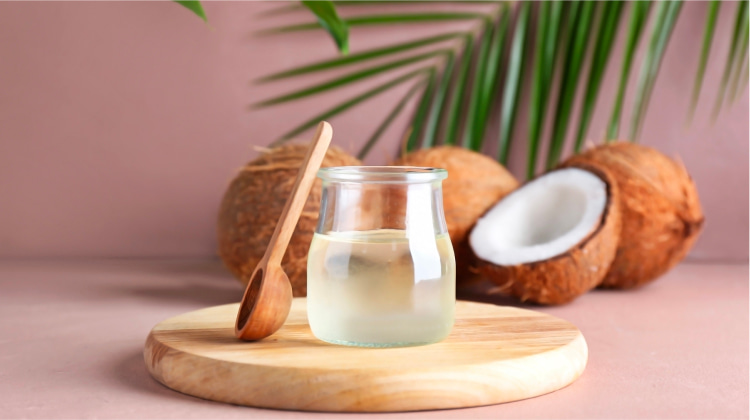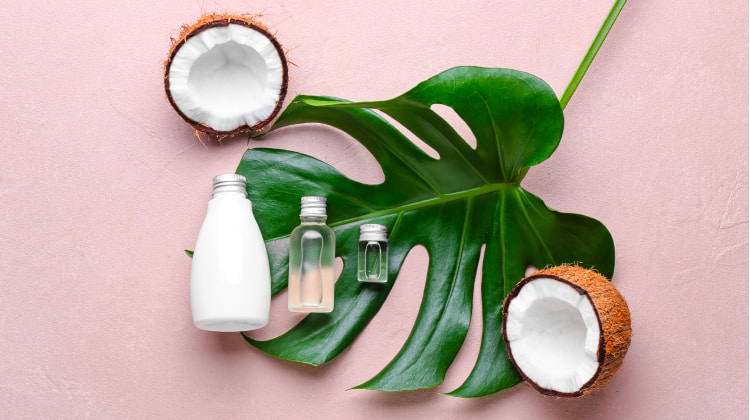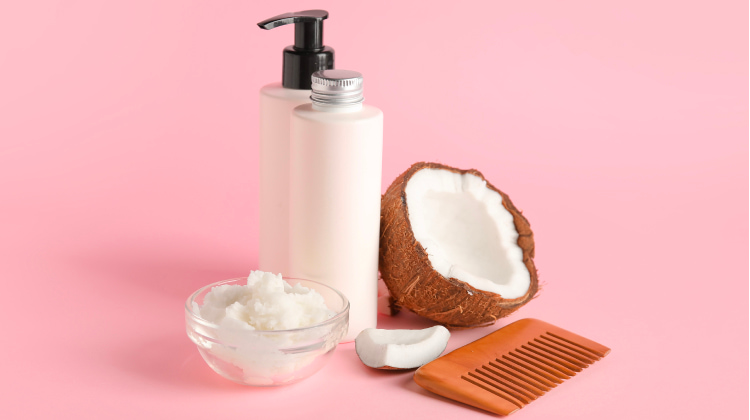
Are you ready to embark on a hair care journey to unlock the secrets of coconut oil and hair dye? In recent years, coconut oil has taken the hair care world by storm, thanks to its myriad of nourishing properties and versatile uses. But does it have any impact on your hair color? This ultimate guide will take you through the ins and outs of coconut oil's relationship with hair dye, exploring its effects, benefits, and any concerns you might have.
We'll delve into the scientific background and provide valuable tips to help you harness the full potential of coconut oil while preserving your vibrant hair color. So, let's dive in and uncover the truth about coconut oil and hair dye, and learn how to enhance your hair care routine like never before!
Does Coconut Oil Fade Hair Color?
Coconut oil has long been recognized for its benefits to hair health(1), but there is some concern that it may affect hair dye. While it can help gently remove hair dye when used as a pre-shampoo treatment or with clarifying shampoos, using pure coconut oil on colored hair is unlikely to cause significant fading. In fact, it can nourish and protect dyed hair.
While some people have reported slight fading, this is not a widespread issue. To ensure that it does not cause any adverse effects, it is important to perform a patch test before using coconut oil on your colored hair.
Additionally, when coloring your hair at home, applying a thin layer of coconut oil on your hairline, neck, and ears before coloring can keep the hair dye off your skin and make it easier to remove any accidental smudges.
11 Benefits of Coconut Oil for Hair

Coconut oil has a range of benefits for hair health, and incorporating it into your hair care routine can promote healthier, more vibrant hair. Here are some of the key benefits of using coconut oil for hair:
Deep Conditioning
Coconut oil is able to penetrate the hair shaft and provide deep moisturization and nourishment, resulting in softer, smoother, and more manageable hair. It helps to repair and prevent damage from heat styling, chemical treatments, and environmental factors like pollution.
Promotes Hair Growth
The nutrients in coconut oil, such as lauric acid, help to strengthen hair and stimulate the scalp, improving blood circulation and promoting hair growth. It also contains vitamins and minerals like vitamin E and iron, which are important for healthy hair growth.
Prevents Protein Loss
Coconut oil helps to reduce protein loss(2) in both damaged and undamaged hair by bonding to the hair proteins. Protein loss is a common cause of hair damage and breakage, so preventing it can help to promote healthier, more resilient hair.
Fights Dandruff
The antifungal and antibacterial properties of coconut oil can help combat dandruff and other scalp conditions by reducing inflammation and soothing the scalp. It also contains medium-chain fatty acids that have been shown to have antimicrobial effects against the yeast that causes dandruff.
Reduces Frizz
Coconut oil smooths hair cuticles and helps to seal in moisture, reducing frizz and making hair more manageable. It also helps to prevent dryness and breakage, which can contribute to frizz and make hair harder to manage.
Protects from Sun Damage

The oil acts as a natural sunscreen, shielding hair from harmful UV rays and environmental factors that can contribute to color fading. UV rays can cause hair to become dry, brittle, and prone to breakage, so protecting it with coconut oil can help to prevent damage and maintain hair health.
Adds Shine
Coconut oil gives hair a natural shine without weighing it down or making it feel greasy. It helps to smooth hair cuticles and seal in moisture, which can make your hair appear shinier and healthier.
Prevents Hair Breakage
By moisturizing and strengthening hair, coconut oil reduces breakage and split ends, promoting overall hair health. It helps to keep hair hydrated and protected from damage, which can help to prevent breakage and keep hair looking and feeling healthy.
Protects Hair Color
Coconut oil forms a protective barrier around the hair shaft, sealing in color and making it last longer. It also conditions the hair, preventing color from being stripped during washing. This can help to maintain hair color and prevent it from becoming faded or dull.
Suitable for Allergies and Sensitive Skin
Coconut oil is a great hair product for those with allergies or sensitive skin, as it is a natural and gentle ingredient that is less likely to cause irritation or adverse reactions than synthetic hair care products. It is also free from harsh chemicals like sulfates, parabens, and silicones, which can be irritating to some people.
Pre-Shampoo Treatment
Coconut oil can be used as a pre-shampoo treatment to condition the hair and help prevent color from being stripped during washing. Applying coconut oil to the hair before shampooing can help to protect it from damage and keep it moisturized, which can help to prevent color fading and maintain hair health.
Cause of Causes Faded Hair Dye

While coconut oil doesn’t really remove hair dye, there are several reasons why your dye can fade faster than expected. Knowing the causes of color fading can help you take steps to maintain your hair color and prevent premature fading. Here are some common reasons why hair color can fade:
Harsh Shampoos
Using shampoos with sulfates and other harsh chemicals can strip hair color, causing it to fade faster. Sulfates are detergents that create the lathering effect in shampoos and can be particularly harsh on color-treated hair.
Opting for sulfate-free shampoos can help maintain hair color by preventing color fading and prolonging the life of the color-treated hair. Sulfate-free shampoos gently cleanse the hair without stripping the natural oils and colors from the hair shaft.
Hot Water
Washing hair with hot water can open up hair cuticles, allowing color to wash out more easily. Hot water can also damage the hair and scalp, leading to dryness and breakage.
To help preserve hair color, it's recommended to use lukewarm or cool water when washing hair. This can help close the hair cuticles, keeping the color locked in and reducing the likelihood of color fading.
Sun Exposure
UV rays from the sun can damage hair color, causing it to fade. Prolonged sun exposure can break down the hair's pigments, leading to faded color and hair damage. Wearing a hat or using hair products with UV protection, like leave-in conditioners and sprays, can help preserve color and protect hair from harmful UV rays.
Chlorine
Swimming in chlorinated water can strip color from hair, making it appear dull and faded. Chlorine can also dry out the hair, leading to breakage and split ends.
To prevent chlorine damage, it's recommended to use a swim cap or apply a protective hair product before swimming. Additionally, rinsing hair with fresh water before and after swimming can help reduce chlorine buildup and prevent color fading.
Heat Styling
.jpg)
Excessive use of heat-styling tools like hairdryers, straighteners, and curling irons can cause hair color to fade over time. The high heat can damage the hair's cuticle, leading to color fading and dryness. Limiting heat-styling and using heat-protectant products, like sprays and serums, can help maintain color vibrancy and protect hair from heat damage.
Overwashing
Washing hair too often can strip away natural oils and color, leading to faster fading. It's recommended to reduce the frequency of hair washing and use color-safe, sulfate-free shampoos to help maintain color vibrancy.
Additionally, using dry shampoo or baby powder between washes can help absorb excess oils and keep hair looking fresh without the need for frequent washing.
Poor Hair Health
Damaged, unhealthy hair is more susceptible to fading and color loss. Maintaining good hair health through regular trimming, deep conditioning, and using nourishing hair products like coconut oil can help keep hair strong and prevent color fading.
Regular hair trims can help remove split ends, while deep conditioning can help restore moisture and protect hair from environmental damage.
Poor Color Application
Incorrect or uneven application of hair dye can result in color that fades faster or appears patchy. To avoid this issue, it's important to follow the hair dye manufacturer's instructions carefully and ensure even coverage.
It may be beneficial to consider seeking professional help for the best results, especially for more complex coloring techniques like highlights or balayage.
Drying Alcohols
Hair care products containing drying alcohols, such as isopropyl alcohol or ethanol, can strip hair of moisture and lead to color fading. To maintain hair color, it's recommended to use alcohol-free products or products with fatty alcohols, which are less harsh and more moisturizing. Fatty alcohols, such as cetyl alcohol or stearyl alcohol, can help provide
Dye Type
Hair dye longevity can vary depending on the type of hair dye used. Semi-permanent and temporary dyes fade more quickly compared to permanent dyes.
Final Thought
In conclusion, pure coconut oil is unlikely to take out hair dye and can actually provide numerous benefits for dyed hair. However, individual experiences may vary, so it's essential to perform a patch test before applying coconut oil to your colored hair to observe any reactions or fading.
To maintain vibrant hair color, avoid factors that contribute to fading, such as harsh shampoos, hot water, sun exposure, chlorine, heat styling, overwashing, and poor hair health. Instead, use coconut oil to nourish and protect your hair, while also preserving its color.
References
1. Gambhirsinh Sursinh Vala and Kapadiya, P.K. (2014). Medicinal Benefits of Coconut Oil (A Review paper). {online} ResearchGate. Available at: https://www.researchgate.net/publication/280574942_Medicinal_Benefits_of_Coconut_Oil_A_Review_paper.
2. Europe PMC (2016). Europe PMC. {online} Europepmc.org. Available at: https://europepmc.org/article/med/12715094.

.jpg)
.jpg)
.jpg)
.jpg)
.jpg)
.jpg)
.jpg)
.jpg)
.jpg)